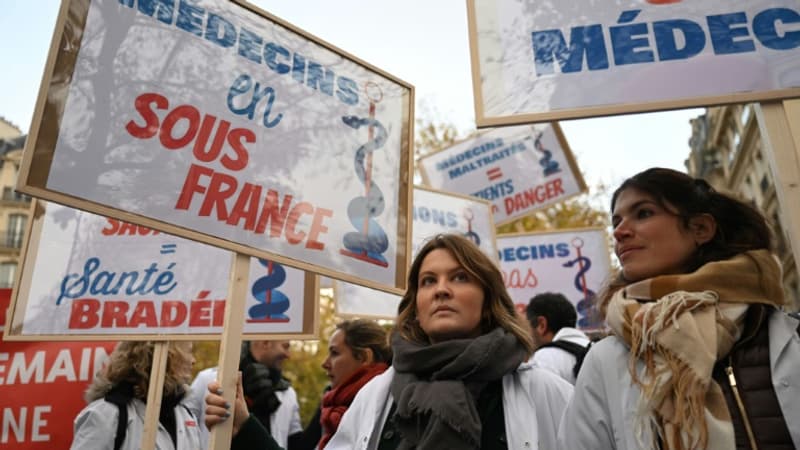From this Monday, December 26 and until January 2, liberal doctors are called to close their practices. The purpose of this strike? He asks that the price of the basic consultation be doubled, which the strikers want to see it go from 25 to 50 euros. But also an improvement in their working conditions.
Some liberal doctors, members of the “Doctors of Tomorrow” collective, are concerned about a questioning of their freedom of installation, while the executive wants to fight against medical deserts, and more generally, to highlight their working conditions, which they consider bad .
“It’s Really Not the Time”
This social movement, which was not relieved by the main unions, comes at a crucial moment for the French health system. The hospital is facing a triple epidemic – of Covid-19, influenza and bronchiolitis – and the emergency rooms are saturated in many French hospitals.
“It’s really not the time, when we’re in a terrible situation. It’s not that we’re saturated, we’re oversaturated,” explains Patrick Pelloux, president of the association of emergency physicians in France.
Last week, in the columns of Sunday newspaperthe Minister of Health, François Braun, had called the liberal doctors tempted by the strike to “responsibility”.
“Without questioning the right to strike, I call for responsibility, because the period between Christmas and New Year is always complicated,” he said.
Frédéric Adnet, head of emergencies at the Avicenne hospital, in Bobigny (Seine-Saint-Denis), evokes an “explosion of pathologies”, which weighs on the number of patients who go to the emergency room. Situation aggravated by the shortage of doctors in the city, and the strike movement.
“Most of them are patients who come for simple consultations. They are not true emergencies, but since they cannot find a doctor in the department, they go to the emergency room, ”he explains.
“We have to stick together”
Same observation in Hénin-Beaumont (Pas-de-Calais). Arnaud Chiche, an anesthesiologist from the northern town, evokes a massive deprogramming in the hospital where he practices, given the impossibility of combining emergency hospitalizations with scheduled ones. However, he says he understands the strike movement started by some of his liberal colleagues.
“We have to stick together,” he says on the BFMTV set.
The anesthesiologist recalls that general practitioners are an “indispensable entity”, which makes it possible to avoid numerous visits to the emergency room when they are consulted by their patients. Responding to the city’s medicine crisis would make it possible to respond in part to the emergency crisis. “The story is if the executive is contemplating, or if we are going to make decisions,” says Arnaud Chiche.
One hour of waiting to consult SOS Médecins
The city’s medical crisis, aggravated by the strike that began on Monday, is also being felt at SOS Médecins, a medical emergency service at home. Interviewed by BFMTV, Dr. Urfan Ashraf, vice president of the organization, mentioned an hour wait for people wanting to contact the service last week.
Currently, SOS Médecins receives 6,000 calls a day, but can only handle 3,000. In the end, 1,500 procedures are performed daily. Urfan Ashraf cites three factors to explain the wave of lawsuits his service is currently facing: the triple epidemic, the very significant hospital pressure and the liberal doctors’ strike.
SOS Solidarity Doctors
But here again, we want to show solidarity with the liberal colleagues on strike.
“We are united in saying that medicine is in crisis,” says Serge Smadja, general secretary of SOS Médecins, on BFMTV.
“The system can no longer charge, we are demanding all possible means,” confides the health professional, who demands that acts carried out at home be specifically promoted. But no desire to strike at the moment, given the seriousness of the current situation.
“Although we fully associate ourselves with the claims, at SOS Médicos we have decided to continue with our activity. We are experiencing an epidemic situation. In my entire career, I have never met so many patients with a demand for care at this time of year,” he explains.
Source: BFM TV


